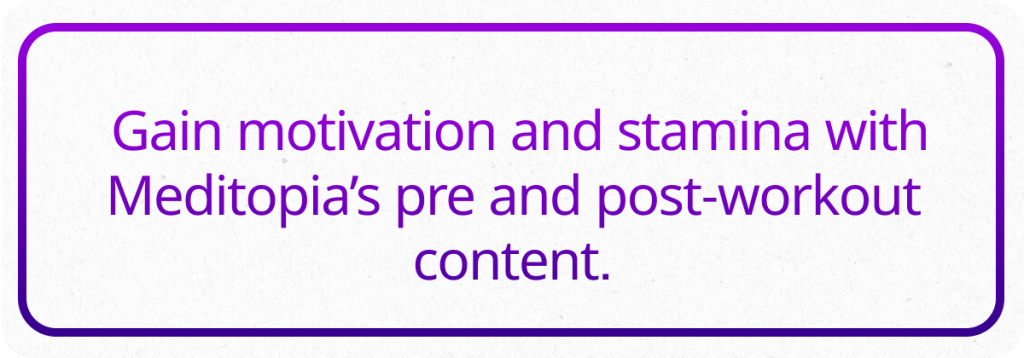Meditation Before or After Workout

Table of contents
Have you ever wanted to work out but lack motivation to start? Do you get easily distracted during your practice and end it earlier? What if you could use mindfulness to your advantage and increase the benefits of your workout?
There’s a deep connection between exercise and meditation. And if you have asked yourself: “Should I practice meditation now or when I’m done exercising?” then keep reading because you’re about to boost your physical and mental well-being with the secrets of meditation.

Why Is Meditation Beneficial When Working Out?
The history of meditation is long and has deep roots in many different cultures. It’s been used to enhance people’s performance in many fields, and sports and exercise are two of them.
In essence, meditation and exercise complement each other, creating a symbiotic relationship that leads to improved physical and mental health. This synergistic relationship has proven to have many benefits for people, here are some of them:
- Mind-Body Harmony: Exercise engages the physical body, strengthening muscles and improving cardiovascular health. On the other hand, meditation engages the mind, fostering mental clarity, focus, and emotional balance. When combined, they create a holistic approach to health, ensuring that both mental and physical aspects are addressed.
- Stress Reduction: Meditation helps to calm the mind, reducing stress hormones like cortisol. Exercise, especially aerobic activities, releases endorphins, which are natural mood lifters. The combination of the two provides a potent defense against stress, anxiety, and depression.
- Enhanced Performance: Meditation before a workout can enhance exercise performance. It improves focus and concentration, allowing individuals to get into the “zone” during their workouts. This heightened mental state can lead to better technique, greater stamina, and more effective workouts.
- Recovery and Relaxation: Meditation aids in post-workout recovery. It promotes relaxation and reduces post-workout muscle tension. This can help prevent injuries, reduce muscle soreness, and speed up the body’s natural healing processes.
- Motivation and Consistency: It helps individuals connect with their inner drive and values, reinforcing their commitment to fitness goals. This is particularly important for those who struggle with exercise adherence. Is this your case?
- Holistic Well-Being: Ultimately, the relationship between meditation and exercise is about achieving holistic well-being. Combining the two practices not only enhances physical fitness but also cultivates mental resilience, emotional balance, and a sense of inner peace. It encourages individuals to take a more balanced and mindful approach to their health.

Meditation Before or After Workout
The choice is actually quite simple and depends on your goals and needs. Meditation before a workout is beneficial when you lack that push to start and finish the session, while meditation after a workout is beneficial to integrate all you did and feel grateful. Let’s explore each option deeper, and choose according to what you need the most.
Meditation Before a Workout
Improved Focus and Concentration
Engaging in a meditation session before your workout can sharpen your focus and enhance concentration. This mental clarity can help you perform exercises with precision and make the most out of your time at the gym or on the track.
Mind-Muscle Connection:
It allows you to mentally prepare for your workout, which can lead to better form, reduced risk of injury, and improved muscle engagement.
Reduced Pre-Workout Anxiety:
Many individuals experience pre-workout jitters or anxiety. Meditation before exercising can help alleviate these feelings, promoting a sense of calm and readiness for your workout.
Techniques for Pre-Workout Meditation:
Consider mindfulness meditation, deep breathing exercises (you can find 5 of them in this article by the way), or visualization techniques before you hit the gym.

Meditation After a Workout
Stress Reduction and Relaxation:
When you’re done exercising, your body may be in need of relaxation. Post-workout meditation can aid in stress reduction and relaxation, allowing your muscles to recover more efficiently.
Muscle Recovery and Reduced Soreness
Meditation can facilitate muscle recovery by reducing inflammation and soreness. This is particularly valuable for individuals engaged in strenuous workouts or strength training.
Enhanced Mood and Mental Clarity
A post-workout meditation session can elevate your mood and provide mental clarity. It helps you transition from the intensity of your workout to the rest of your day with a positive mindset.
Techniques for Post-Workout Meditation:
Try progressive muscle relaxation, body-scan meditation, or simple breathing exercises to unwind and promote recovery. If you’re interested in knowing more types of meditation, read our blog on this topic.
Final Thoughts
Some individuals find that a combination of both, meditating before or after exercising works best for them, while others may favor one over the other based on their fitness goals and daily schedule. In the end, the benefits of meditation are overall positive for your physical and mental well-being. What’s important is to define what you need from your mindfulness tool, and choose accordingly.

